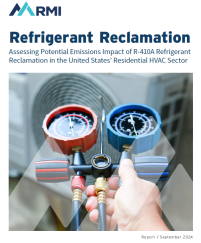As record-setting temperatures become the new normal, so does our reliance on cooling systems to keep our residential and commercial buildings comfortable, food supply chains more reliable, and medicines more available for the world’s growing population.
As the most used refrigerants today, hydrofluorocarbon’s (HFC’s) such as R-410A, have a high global warming potential (GWP) and if released to atmosphere are potent greenhouse gases contributing to climate change. Lifecycle Refrigerant Management (LRM) practices, including recovery and reclamation, are an overlooked climate solution that prevents the release of refrigerant into the atmosphere. Despite the undeniable benefits of LRM, utilization remains low in the United States, with only an estimated 1.6 percent of HFC’s recovered and reclaimed annually as of 2022 EPA reported data. Just considering the opportunity to recover refrigerants from systems that reach end of life there is significant room for growth in recovery and reclamation of all refrigerants
A new report by the Rocky Mountain Institute, sponsored by Hudson Technologies, highlights the positive climate impact of using reclaimed refrigerant R-410A (the most commonly used refrigerant in residential equipment) for servicing existing air conditioning and heat pump equipment. The report’s conclusions are stunning, identifying that reclaimed refrigerant can reduce greenhouse gas emissions up to 70% compared to that of newly manufactured virgin refrigerant.

Hudson Technologies recognizes the importance of Lifecycle Refrigerant Management and is shaping the circular economy for refrigerants to address the growing demand for reclaimed refrigerants. As one of the largest reclaimers in the United States, Hudson has long supported Lifecycle Refrigerant Management. Refrigerant reclamation is not only a critical component of addressing climate change but also an economically viable way to meet the growing demand for refrigerants.
Companies choosing to use reclaimed refrigerants for equipment first fill, or for servicing needs are deriving the benefit of a lower carbon footprint solution and taking steps to reduce the impact of refrigerant emissions on the environment. Through the action of using certified R4 reclaimed refrigerant these companies support their sustainability, carbon management and ESG goals in a verifiable manner.


